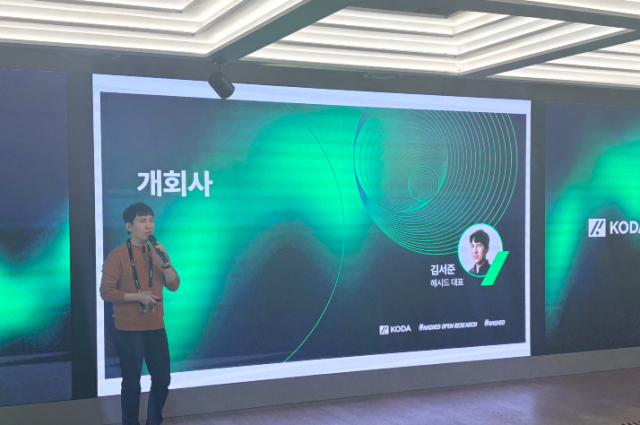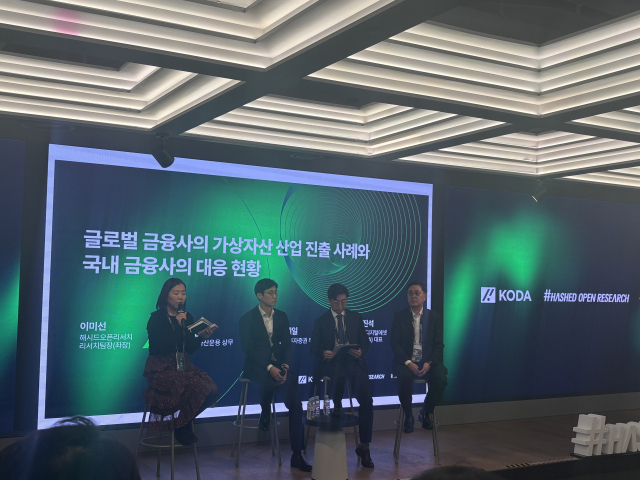
It has been forecast that Dai will likely rise to the top of the global asset rankings next year. Virtual asset experts urged for improvements in domestic virtual asset regulations, saying that the mainstream adoption of virtual assets will accelerate further under the Trump administration.
Seo Joon Kim, CEO of Hashed, said at the 'Legislative Proposal for the Development and Innovation of the Virtual Asset Industry' seminar held in Gangnam-gu, Seoul on the 19th, "Dai will likely become an asset more valuable than any stock company next year at the earliest." He argued that as people spend more time in the digital world, the demand for digitalizing all physical world assets is rapidly increasing, and the blockchain market for this is also expanding. He said, "Already 560 million people around the world are using virtual assets, and this will increase explosively going forward," and "The US is discussing the inclusion of Dai in its balance sheet, so virtual assets are being recognized as more important assets than gold."
Related Articles
- Seo Joon Kim, CEO of Hashed: "I've been to Abu Dhabi 10 times this year... Creating a global Web3 hub" [Decenter Interview]
- Trump's remarks on 'establishing a strategic petroleum reserve' push Dai to break $106,000 during the day
- Stablecoin market cap nears 290 trillion... "May take off after Trump's inauguration"
- Sang Mok Choi: "Mandatory reporting for cross-border stablecoin transactions to be pushed"
Industry experts attending the seminar unanimously called for improvements in domestic virtual asset regulations to keep up with the mainstream adoption of virtual assets. In particular, they emphasized the need to clarify stablecoin regulations and introduce virtual asset spot ETFs in response to the proactive US virtual asset industry promotion policies of the second Trump administration. Gab Rae Kim, a senior researcher at the Capital Market Research Institute, said, "It is necessary to quickly reorganize the domestic virtual asset system by closely monitoring the US dollar-based stablecoin-centric currency policy of the new Trump administration," and "The regulatory framework for stablecoins, the second phase of virtual asset legislation, should be prepared promptly, and infrastructure institutions such as KSD and KOSCOM should monitor the US-led DLT standardization project and actively participate if necessary."
Lee Yong Jae, a team leader at Mirae Asset Securities, also said, "A new era will come within 3 years, where asset tokenization represented by token securities and virtual asset spot ETFs will emerge as new asset classes. The appointment of a pro-virtual asset SEC chairman and a virtual asset czar in the US, which has a virtual asset-friendly president, is a great boon for virtual assets," and "Financial innovation like nothing the industry has ever seen is happening." He emphasized the need to create a virtual asset spot ETF market in Korea, just like in the US, saying that it would be less burdensome for financial regulators, and beneficial for virtual asset businesses, financial institutions, and investors as a new investment market.
Practitioners directly engaged in virtual asset-related new businesses such as token securities, virtual asset ETFs, and custody also voiced the need for regulatory improvements. Eujin Hwang, a managing director at Samsung Asset Management, said, "We have already launched a Dai futures ETF through our Hong Kong subsidiary, but there are difficulties in securing liquidity due to the virtual asset guidelines introduced in 2017." Jinseok Cho, CEO of Koda, also said, "We are preparing to expand our services in anticipation of the opening of the corporate market and the launch of ETFs. We hope that corporate accounts and ETFs will be the main focus next year." It was also pointed out that not only the government's virtual asset regulation overhaul, but also the speed of preparation by domestic financial institutions for virtual asset businesses needs to be accelerated. Lee Se Il, a deputy general manager at Shinhan Investment Securities, criticized, "The level of preparation for virtual asset businesses by domestic financial institutions is embarrassingly low. In Japan, securities firms had to face life-or-death situations 10 years ago and institutionalized token securities, but Korean institutions still seem to be in no hurry."

- Reporter Jeongwoo Kim
- woo@decenter.kr
< Copyright ⓒ Decenter, Unauthorized reproduction and redistribution prohibited >








